Latest topics
» Borodino Mapby rschilla Yesterday at 10:23 pm
» Kriegsspiel: A Bridge Too Far (AAR)
by Martin Sat Nov 16, 2024 6:31 pm
» targeting artillery targets
by Saucier Tue Oct 29, 2024 12:15 am
» Grog can't make it
by Grog Fri Sep 13, 2024 5:59 pm
» Toggle vegetation = true not working
by popeadrian Fri Aug 30, 2024 11:43 pm
» 1862 Kriegsspiel manual by Von Tschiscwitz
by modron Thu Aug 29, 2024 8:23 pm
» SOW Scenario Generator
by popeadrian Sun Aug 25, 2024 5:39 pm
» Guide to map making?
by popeadrian Wed Aug 14, 2024 1:44 am
» SOWWL Artillery batteries
by Uncle Billy Thu Jul 11, 2024 3:15 pm
» Set Up for SOWWL NAPOLEON GAMES For Kriegspiel style
by Uncle Billy Tue Jul 09, 2024 10:35 pm
» The New SOWWL Is Now Available On Steam
by Grog Mon Jul 08, 2024 8:14 pm
» Boxed KS set Wallington NT near Morpeth
by Martin Sat Jun 08, 2024 3:50 pm
Statistics
We have 1602 registered usersThe newest registered user is cyrilus
Our users have posted a total of 30540 messages in 2306 subjects
Log in
14. Battle of Aranjuez - 25th September 1808
+6
kg little mac
Uncle Billy
WJPalmer
Iberalc
Martin
Mr. Digby
10 posters
Kriegsspiel News Forum :: PC-Based Kriegsspiels :: Scourge of War :: Campaigns :: Napoleonic Peninsular Campaign
Page 3 of 3
Page 3 of 3 •  1, 2, 3
1, 2, 3
 Waterloo and Napoleons thoughts of positioning an army in front of woods Random thoughts
Waterloo and Napoleons thoughts of positioning an army in front of woods Random thoughts

When, given a choice, contemporary commanders chose to fight within the woods. Often they aligned themselves at the edge of a woodland in order to shoot out into an adjoining field. The cover of woods and copses was a crucial element of military tactics. Troops or artillery could be concealed in the fringes of these areas, or large-scale troop movement could be carried out behind wooded areas, offering protection from enemy fire and leaving the enemy oblivious to unit placement. During the nineteenth century, on the verge of the transformation to modernised conflict, woodlands were used to great effect, notably at the Battle of Waterloo during the Napoleonic wars in 1815, and later at the Battle of Gettysburg,
ON WATERLOO
Napoleon Bonaparte in Mémoires pour servir à l'histoire de France en 1815, avec le plan de la bataille de Mont-Saint-Jean repeatedly criticised the Duke of Wellington's choice of battle field because of the forest to his rear.
On page 124, Bonaparte wrote, "He had in his rear the denies of the forest of Soignes, so that, if beaten, retreat was impossible", and on page 158 — "The enemy must have seen with affright how many difficulties the field of battle he had chosen was about to throw in the way of his retreat", and again on page 207 — "The position of Mont-Saint-Jean was ill-chosen. The first requisite of a field of battle, is, to have no defiles in its rear. The injudicious choice of his field of battle, rendered all retreat impossible." "Forest of Soignes" Waterloo blunder also see The twelve great battles of EnglandHowever, Napoleon's view was contradicted by Jomini, who pointed out that Wellington had good roads behind his centre and each wing which would have made a retreat through the forest safer than across an open field: Napoleon's cavalry would have been hampered by the forest in their attempts to turn any retreat into a rout. Some have argued that there was no bottom to the forest and it would not have hampered an extraction given Wellington's superlative expertise in handling an army disengaging from the enemy,while others have suggested that Wellington if pressed intended to retreat eastwards towards Blücher's Prussian army so the interior of the wood was of little military significance.

"The English are amassed on Mont-Saint Jean, that is in front of the forest of Soignes. If the Prussians retreat behind the forest of Soignes you must send a thousand cavalry behind them, and come with your troops to join us. If one finds they intend to come in front of the forest at Mont Saint-Jean, then make a screen and bar the route. Ney. "
This dispatch from Ney to Général Lobau, commander of the French VI corps, was written on the morning of the day the battle on 18 June and outlines an alternative strategy based on the movements of the Prussian army under Marshal Blücher whom Napoleon had forced to retreat north-east toward Wavre, following the battle at Ligny, 15 km NE. of Charleroi on the 16th. That same day Wellington had engaged the French under Ney, at Quatre Bras, 13 km south of Waterloo. He was now obliged to fall back in fighting retreat to the valley south of Waterloo and his defensive position on the escarpment to await the arrival of Blücher's Prussians, the impending news of which he received at 2 am on the 18th. The battle lines were now drawn on opposite sides of the shallow valley.
Had Wellington been defeated and Blücher been unable to bring his army to join that of Wellington's, this dispatch could have become critical as it outlines the next step. Again forests and woodland were not off limits to troop movements and tactics.

However Prussian Light Infantry in the Jena Campaign are criticised and the French Grande Armee praised by Friedrich August von der Marwitz ‘The effect of the old Prussian fire has been completely lost, and we sacrifice an enormous number of men in villages and woodland where the French often lure us since they are much more proficient than we are, because any Frenchman knows better how to ensure his personal advantage than the German. ’
PS
Other Napoleonic examples of forest fighting
- Battle of Berezina
http://www.wargamer.com/article/3287/miniature-wargaming-battle-of-berezina
- Hanau
http://en.wikipedia.org/wiki/Battle_of_Hanau
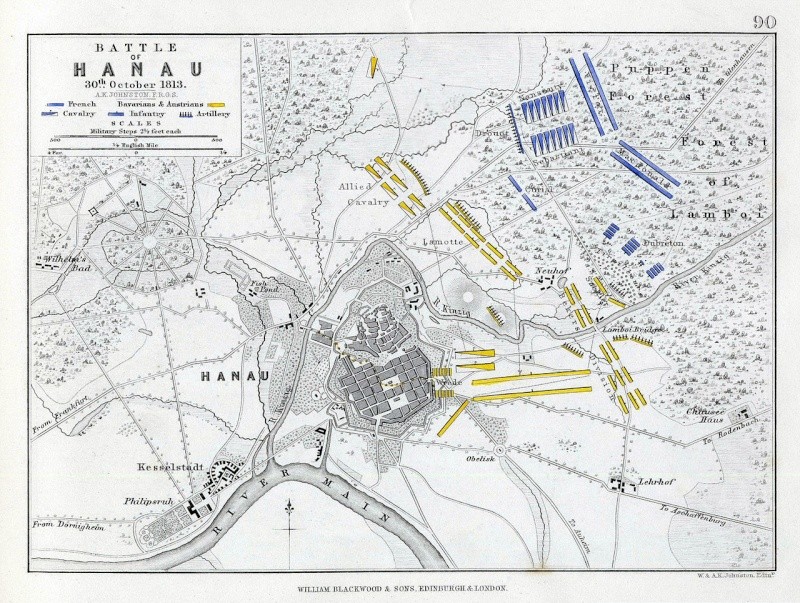
Just look at that deployment in the forest.
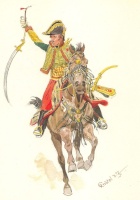
Calpurnius- Posts : 52
Join date : 2013-04-08
Age : 46
Location : Bakersfield, Caifornia
 Re: 14. Battle of Aranjuez - 25th September 1808
Re: 14. Battle of Aranjuez - 25th September 1808
Interesting post Brett. I think it supports my case nicely. 
However I'm talking about the Spanish army here, as distinct from other armies in Europe. I did say this in the discussion in the Allied forum. I would think very hard before saying with a blanket-certainty that British, Prussian, Russian and Austrian infantry could not enter woodland. However the account above does make it distinct that the French infantry in 1806 was at an advantage in woodland fighting over the Prussian infantry - again I raised this exact point before when talking about the Prussian 1806 army's doctrine. Like the Spanish, it was a Frederican (linear, non-corps organised) army. The account quoted definitely makes the case that the Prussian infantry could not operate in woods with the same ease as the French in that battle.
All the discussion on Waterloo above seems to make the point that forests were significant obstacles to armies except via roads cleared through them. We know that in the few wooded areas at Waterloo where infantry fought (the wood south of Hougoumont and the wooded areas around Frischermont and Pappelotte) that skirmishers were employed in these areas. When the Prussians approached on the rising ground above Plancenoit they sent their fusilier battalions through the woods. These were skirmish-capable battalions.
At Bossu at Quatre-Bras, line battalions worked in open order and after hours of fighting and gained and lost fortunes the troops of both sides had broken down into unco-ordinated masses. Remember too that these were among the best infantry in Europe - French veterans and Dutch previously in French service, plus towards the later half of the action the British guards were deployed in there. All of these fellows are a far cry from the average Spanish infantryman of 1808 and even they lost cohesion after a prolonged fight in a forest.
The Hanau map is really interesting. You referred to the French positions inside the woods but I'd draw your attention to the Austrian and Bavarian positions outside the woods! Look how they deploy in the open all along the woods edge and on their right appear to have thrown up earthworks and cleared and laid an abbatis. I've already said I'm fine with French infantry in woods; we played Aranjuez in that format.
The marked positions of the French cavalry and artillery on their right are interesting though. Both cavalry columns appear to be astride tracks through the forest and you can tell by the absolutely perfect alignment of the unit symbols that these do not represent the actual positions of the troops, but more likely the area in which they operated or marched. I'd need to read an account of Hanau (I read it years ago in Chandler but have forgotten the details) but I interpret that map as showing two cavalry columns moving through the wood via two trails.
The artillery position is strange. It appears to have its left on a road and its right across a stream. Obviously one doesn't deploy cannons across streams and its field of fire there would most likely be very severely limited. I'm very dubious about the accuracy of that marked position!
No; right now I think keeping formed Spanish infantry and all artillery and cavalry out of the largest areas of woodland is the correct approach. Some players are not happy with the restriction on Spanish cavalry brigade command so I'll willingly respect the preference of the majority if more people would chip in with their opinions.
However I'm talking about the Spanish army here, as distinct from other armies in Europe. I did say this in the discussion in the Allied forum. I would think very hard before saying with a blanket-certainty that British, Prussian, Russian and Austrian infantry could not enter woodland. However the account above does make it distinct that the French infantry in 1806 was at an advantage in woodland fighting over the Prussian infantry - again I raised this exact point before when talking about the Prussian 1806 army's doctrine. Like the Spanish, it was a Frederican (linear, non-corps organised) army. The account quoted definitely makes the case that the Prussian infantry could not operate in woods with the same ease as the French in that battle.
All the discussion on Waterloo above seems to make the point that forests were significant obstacles to armies except via roads cleared through them. We know that in the few wooded areas at Waterloo where infantry fought (the wood south of Hougoumont and the wooded areas around Frischermont and Pappelotte) that skirmishers were employed in these areas. When the Prussians approached on the rising ground above Plancenoit they sent their fusilier battalions through the woods. These were skirmish-capable battalions.
At Bossu at Quatre-Bras, line battalions worked in open order and after hours of fighting and gained and lost fortunes the troops of both sides had broken down into unco-ordinated masses. Remember too that these were among the best infantry in Europe - French veterans and Dutch previously in French service, plus towards the later half of the action the British guards were deployed in there. All of these fellows are a far cry from the average Spanish infantryman of 1808 and even they lost cohesion after a prolonged fight in a forest.
The Hanau map is really interesting. You referred to the French positions inside the woods but I'd draw your attention to the Austrian and Bavarian positions outside the woods! Look how they deploy in the open all along the woods edge and on their right appear to have thrown up earthworks and cleared and laid an abbatis. I've already said I'm fine with French infantry in woods; we played Aranjuez in that format.
The marked positions of the French cavalry and artillery on their right are interesting though. Both cavalry columns appear to be astride tracks through the forest and you can tell by the absolutely perfect alignment of the unit symbols that these do not represent the actual positions of the troops, but more likely the area in which they operated or marched. I'd need to read an account of Hanau (I read it years ago in Chandler but have forgotten the details) but I interpret that map as showing two cavalry columns moving through the wood via two trails.
The artillery position is strange. It appears to have its left on a road and its right across a stream. Obviously one doesn't deploy cannons across streams and its field of fire there would most likely be very severely limited. I'm very dubious about the accuracy of that marked position!
No; right now I think keeping formed Spanish infantry and all artillery and cavalry out of the largest areas of woodland is the correct approach. Some players are not happy with the restriction on Spanish cavalry brigade command so I'll willingly respect the preference of the majority if more people would chip in with their opinions.
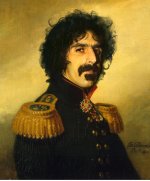
Mr. Digby- Posts : 5769
Join date : 2012-02-14
Age : 65
Location : UK Midlands
 Re: 14. Battle of Aranjuez - 25th September 1808
Re: 14. Battle of Aranjuez - 25th September 1808
"When, given a choice, contemporary commanders chose to fight within the woods. Often they aligned themselves at the edge of a woodland in order to shoot out into an adjoining field. The cover of woods and copses was a crucial element of military tactics. Troops or artillery could be concealed in the fringes of these areas, or large-scale troop movement could be carried out behind wooded areas, offering protection from enemy fire and leaving the enemy oblivious to unit placement"
Interesting point here, Brett.
Here's an example of how General Belvedere used this defensive tactic at the Battle of Burgos O De Gamonal 10th November 1808:

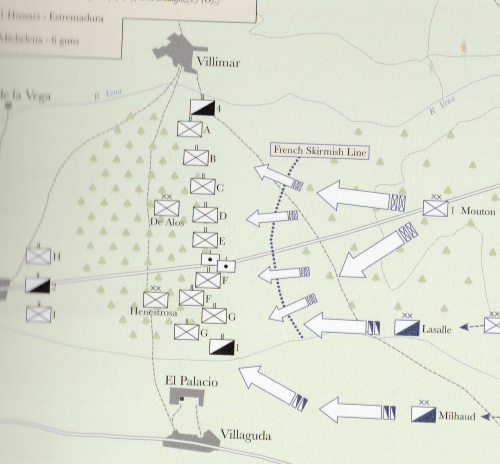 " />
" />
"[Belevedere] deployed his nine battalions in a line along the front edge of a substantial wood....the other two battalions were in the rear with the 2nd Hussars.." The Peninsular War Atlas-Nick Lipscomb
Perhaps we should consider this practice in the game?
Also, this map of the Spanish deployment at Bailen (1808) suggests that their right wing might have been at least partially in a wood but difficult conclude this from the map.
Interestingly, note the Spanish skirmishers in the wood, encountered there by French heavy cav " [which] cut their way deep into the strong skirmish lines provided by the 3rd Guardias Walonas and the 1st Suizo, neither being able to form square to meet the threat"

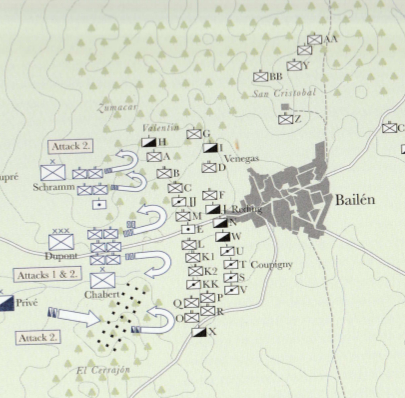 " />
" />
Mike
Interesting point here, Brett.
Here's an example of how General Belvedere used this defensive tactic at the Battle of Burgos O De Gamonal 10th November 1808:
 " />
" />"[Belevedere] deployed his nine battalions in a line along the front edge of a substantial wood....the other two battalions were in the rear with the 2nd Hussars.." The Peninsular War Atlas-Nick Lipscomb
Perhaps we should consider this practice in the game?
Also, this map of the Spanish deployment at Bailen (1808) suggests that their right wing might have been at least partially in a wood but difficult conclude this from the map.
Interestingly, note the Spanish skirmishers in the wood, encountered there by French heavy cav " [which] cut their way deep into the strong skirmish lines provided by the 3rd Guardias Walonas and the 1st Suizo, neither being able to form square to meet the threat"
 " />
" />Mike

Grog- Posts : 847
Join date : 2012-08-31
Age : 55
Location : Nottingham, England
 Re: 14. Battle of Aranjuez - 25th September 1808
Re: 14. Battle of Aranjuez - 25th September 1808
Since I am Belvedere I request a special use of woods pass. LOL interesting and educational reading about the WOODS!!
Guest- Guest
Page 3 of 3 •  1, 2, 3
1, 2, 3
 Similar topics
Similar topics» 13. Battle of Calahorra - 14th September 1808
» 17. Battle of Pamplona - 9th December 1808
» TURN 7 - Early September 1808
» TURN 8 - Late September 1808
» 07. Battle of Barcelona - 19th July 1808
» 17. Battle of Pamplona - 9th December 1808
» TURN 7 - Early September 1808
» TURN 8 - Late September 1808
» 07. Battle of Barcelona - 19th July 1808
Kriegsspiel News Forum :: PC-Based Kriegsspiels :: Scourge of War :: Campaigns :: Napoleonic Peninsular Campaign
Page 3 of 3
Permissions in this forum:
You cannot reply to topics in this forum